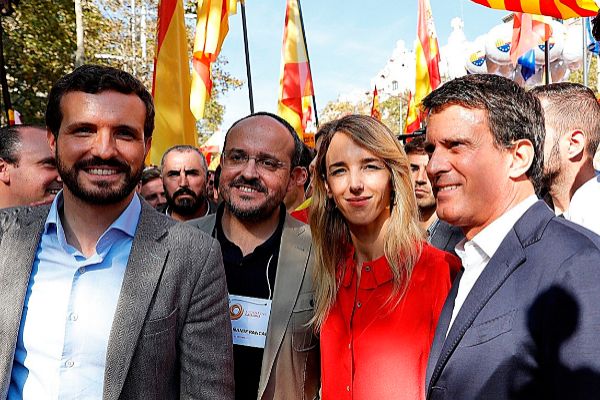- Catalonia.ERC threatens Sánchez with "exercising self-determination" again if the negotiating table does not advance
- Newspaper library: More than one million people collapse Barcelona against independence
The possibility of forming a large constitutional platform for the next Catalan elections, which could be held in spring or summer given the degree of confrontation between JxCat and ERC, is still remote. But, in no case, disposable since both the PP and the former French Prime Minister and Councilor in Barcelona Manuel Valls keep the dialogue path open.
The delicate political and social situation in Catalonia, where the independence movement continues without renouncing the insurrectionary path despite the cessions of the Government of Pedro Sánchez, and the strategic commitment of the PSC to form a new tripartite with ERC and the commons of Ada Colau, forces to constitutionalism to a regrouping. This is understood, at least, by the PP, which has long been proposing the constitution of a kind of « Catalonia Suma », entities such as Catalan Civil Society that call to recover the «spirit of October 8», the great anti-independence demonstration of 2017 , and also the Barcelona pel Canvi party , led by Valls. Citizens, on the other hand, resists the idea with the hope of remaining as the first anti-independence force of the Parliament .
Despite the obvious difficulties, due to the ideological differences of each party, its strategic positions and some personal vetoes, the dialogue about this alliance has not been broken. Pablo Casado and Manuel Valls commented, through the intermediation of Cayetana Álvarez de Toledo and the Catalan PP leader, Alejandro Fernández , this possibility before last Christmas .
The two leaders agreed to continue exploring, far from media focuses and the daily political battle, how to articulate a constitutionalist electoral platform that poses a face to separatism and, in passing, avoid the entry of Vox into the Parlament. A platform that, to crystallize, would be ideologically broader than Navarra Suma - center-right alliance formed by UPN, PP and Cs -, and would try to incorporate small parties or entities of the anti-nationalist left, and prominent personalities of civil, cultural and economic society of Catalonia.
"It will be very difficult, but seeing what is happening in the Government of Spain with Esquerra, we are all clear that we cannot allow a tripartite in Catalonia," say sources around Valls. Meanwhile, from the PP it is pointed out that the independence attack forces a gesture of responsibility on the part of everyone. In this sense, the vice-secretary of Territorial Policy of the PP, Antonio González Terol , last December insisted that the project to group the constitutionalist vote "is still alive" in Galicia , Catalonia and the Basque Country .
One of the obstacles to this regrouping is the differences in the left-right ideological axis. The Barcelona pel Canvi party that Valls leads aspires to occupy, both in Catalonia and in Spain as a whole, the constitutionalist center-left space that "has left the PSOE orphaned" with its agreements with ERC and Podemos, as well as Citizens "for their pacts with Vox ». From what they understand, an electoral alliance with the PP has "the risk" of picking them to the right in public perception. While popular ranks are not lacking those who point out the support of Valls to the investiture of Ada Colau as mayor of Barcelona as one of the reasons why any pact with him should be avoided.
However, Valls' good personal and political relationship with Álvarez de Toledo, with whom he has long agreed on the need to exercise a frontal opposition to nationalism and populism, and with Alejandro Fernández, president of the Catalan PP, is facilitating dialogue between the Franco-Catalan politician and Pablo Casado. Likewise, Fernández has already said that he is willing to have a secondary role in the electoral list if an independent candidate with sufficient media pull and moral authority is found to rise above the ideological nuances.
Finding a consensus candidate is not an easy task. Nor to seduce Citizens, the main obstacle to this great alliance. The party rejected before the last general elections the offer to form a "Spain Suma" that Alvarez de Toledo raised and continues in no. Especially the Catalan leadership, headed by Lorena Roldán and Carlos Carrizosa , who resist losing their quotas of power. The wound left by the rutpura de Valls with Citizens at the Barcelona City Council does not help either.
On the other hand, in the parliamentary group in the Catalan Chamber there are more and more voices that demand the regrouping to avoid an «electoral escabechina». The good understanding between Inés Arrimadas and Valls could unlock, at least, the dialogue when the leader is elected next March president of the orange formation. It would be a first and decisive step for the constitution of the constitutionalist platform.
According to the criteria of The Trust Project
Know more- PP
- Citizens
- Barcelona
- ERC
- Manuel Valls
- Pablo Casado
- Vox
- Spain
- Cayetana Álvarez de Toledo
- Ada Colau
- Politics
- Catalan Elections
- Junts per Catalunya
- Catalonia independence
Politics Manuel Valls finalizes his candidacy pending the PSOE-ERC pact
Politics Pedro Sánchez will sit with Quim Torra to finalize the negotiating table on Catalonia
Politics The investiture of Pedro Sánchez leaves ERC and JxCat on the verge of breaking up

